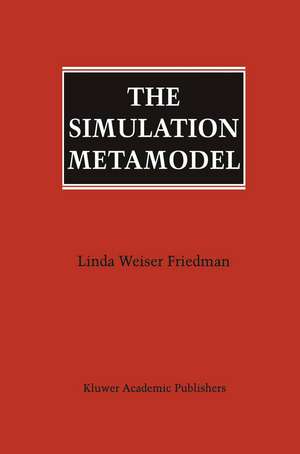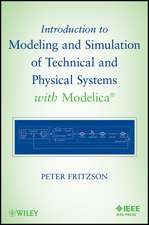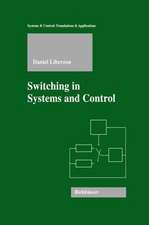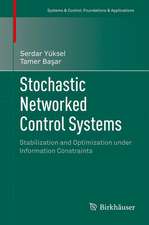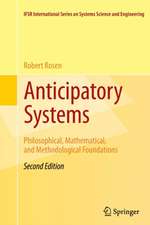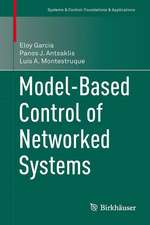The Simulation Metamodel
Autor Linda Weiser Friedmanen Limba Engleză Paperback – 26 sep 2011
The use of metamodels allows the researcher to work with a set of mathematical functions and analytical techniques to test simulations without the costly running and re-running of complex computer programs. In addition, metamodels have other advantages, and as a result they are being used in a variety of ways: model simplification, optimization, model interpretation, generalization to other models of similar systems, efficient sensitivity analysis, and the use of the metamodel's mathematical functions to answer questions about different variables within a simulation study.
| Toate formatele și edițiile | Preț | Express |
|---|---|---|
| Paperback (1) | 637.13 lei 6-8 săpt. | |
| Springer Us – 26 sep 2011 | 637.13 lei 6-8 săpt. | |
| Hardback (1) | 643.34 lei 6-8 săpt. | |
| Springer Us – 30 noi 1995 | 643.34 lei 6-8 săpt. |
Preț: 637.13 lei
Preț vechi: 749.56 lei
-15% Nou
Puncte Express: 956
Preț estimativ în valută:
121.91€ • 127.63$ • 100.88£
121.91€ • 127.63$ • 100.88£
Carte tipărită la comandă
Livrare economică 05-19 aprilie
Preluare comenzi: 021 569.72.76
Specificații
ISBN-13: 9781461285564
ISBN-10: 1461285569
Pagini: 228
Ilustrații: XX, 202 p.
Dimensiuni: 155 x 235 x 12 mm
Greutate: 0.33 kg
Ediția:Softcover reprint of the original 1st ed. 1996
Editura: Springer Us
Colecția Springer
Locul publicării:New York, NY, United States
ISBN-10: 1461285569
Pagini: 228
Ilustrații: XX, 202 p.
Dimensiuni: 155 x 235 x 12 mm
Greutate: 0.33 kg
Ediția:Softcover reprint of the original 1st ed. 1996
Editura: Springer Us
Colecția Springer
Locul publicării:New York, NY, United States
Public țintă
ResearchCuprins
1 Introduction To Simulation Modeling And Metamodeling.- 1 References.- 2 The Simulation Model And Metamodel.- The Simulation Model.- The Simulation Metamodel.- Levels of Abstraction in Simulation.- 2 References.- 3 The Metamodel In Perspective: Statistical Considerations In Simulation Experiments.- Some Statistical Considerations.- Strategic Considerations.- Tactical Considerations.- Experimental Design in Simulation.- The Multiple Response Simulation Experiment.- 3 References.- 4 Metamodeling.- Building the Simulation Metamodel.- Steps in Metamodeling.- Validating the Simulation Metamodel.- Example: A Metamodel for the M/M/s Queuing System.- The Simulation Model.- The Simulation Metamodel.- Validating the Simulation Metamodel.- Using the Simulation Metamodel.- 4 References.- 5 Survey Of Current Research.- Metamodel Usage.- Sensitivity Analysis.- Optimization.- Decision Support.- Applications.- Manufacturing.- Ecology.- Computer Performance Evaluation.- Hospital Planning.- Military.- Metamodel Methodology.- Method of Statistical Analysis.- Sample Size.- Variance Reduction.- The Metamodeling Experiment.- Metamodel Validation.- Metamodeling: Assessing the Technique.- Combining Metamodeling with other Model Types.- 5 References.- 6 Metamodeling: Some Additional Examples.- Example: A Time-shared Computer System.- Example: An Inventory Control System.- 6 References.- Appendix: The Linear Regression Model.
